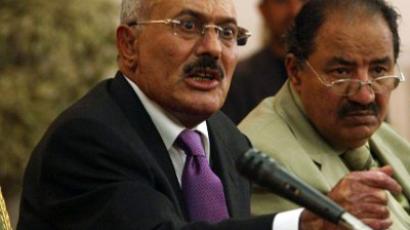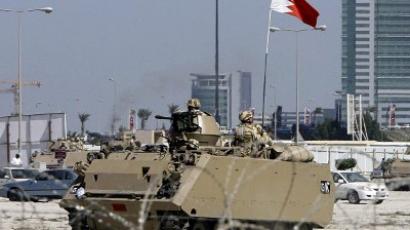US ‘heading for disaster’ by putting empire over economy
The US could collapse like the USSR, because it pursues futile military policies at the expense of economy, says Clyde Prestowitz, ex-Counselor to the Secretary of Commerce in the Reagan Administration. He thinks this track is risky and destructive.
RT: In one of your recent articles called Trading Jobs for Military Bases, you say the US sacrifices its economic interests in the name of geopolitics.CP: Yes, there is a very good recent example: the Obama administration has just announced a so-called pivot to Asia. So, the idea is that the US is switching the focus of its military and geopolitical activity from Afghanistan and Iraq and the Middle East to Asia, to the Pacific and to the China region. And it's doing it in a way that undermines its ability to invest, to be competitive with Chinese or Japanese or other Asian production. RT: Is the military the only tool for the US left to influence the world?CP: The US is suffering declining economic competiveness: we have a big trade deficit, we are heavily in debt to China and to the rest of the world. Our major source of international power is not economic, it's military. We are actually a lot like the former Soviet Union: the USSR didn't collapse because it lacked military strength, it collapsed because it lacked economic strength. The same things are now happening to the US. RT: Do you think the US is collapsing?CP: Well, not collapsing just yet, but it's not on a good track. RT: What would you say if someone in the Administration told you the US protects its economic interests with the help of military means?CP: Let's look at the so-called new pivot to Asia: we are beefing up our military deployments in the Western Pacific. But there is no threat to us in the Western Pacific! China is not going to invade the Unites States, North Korea's missiles can't reach the United States, American oil doesn't come through the Strait of Malacca. So, what is the threat? How is it that this military deployment is protecting our interests? It's an infatuation with empire, an infatuation with the exercise of power. It's a legacy of the Second World War and of the Cold War. We have a big national security machine and that machine is powerful politically and our system looks for a way to make itself useful and so that's what it does. But it is not clear to me that this is in the interest of the United States. The incentives in the system right now are for the production of tradable goods and the provision of tradable services to leave the US. The United States is not pursuing any of the policies necessary to reverse the incentives because its total focus is on geopolitical priorities. RT: So, it's all about the US bases and expanding the US military around the globe?CP: It's all about maintaining the primacy of the US national security establishment.RT: At the expense of the US economy?CP: Yes.RT: The US has vast military presence in the Persian Gulf region where it keeps its eyes wide shut over human rights violation in Bahrain, arguably because of its Fifth Fleet Bahrain hosts. Do political and economic compromising of principles go hand in hand?CP: Yes, they do. The situation in Bahrain is extremely painful to the US. In terms of human rights we clearly should be on the side of the Shiites. But we have sided with the ruling Sunni regime because of the Fifth Fleet base in the Gulf. And I think that we compromised ourselves. RT: So, the US makes not only economic concessions, but political as well?CP: Yes, I think that we are compromising our own principles. RT: What sacrifices can the US offer to China to make it buy less Iranian oil?CP: The US is asking China to buy less Iranian oil, the US is asking China to put pressure on North Korea to stop its missile program. So, we are asking the Chinese to do a lot of geopolitical things. What we do not ask the Chinese to do is to stop manipulating their currency, to keep their currency undervalued as a substitute for their exports. We don't complain about that. We say "Fine! Do it!"RT: And Obama doesn't want a conflict because…CP: By not forcing the currency issue, it makes it easier for the president to ask the Chinese to buy less Iranian oil. Or to ask the Chinese to pressure on the North Koreans to stop their missile program. He'd rather ask them to stop buying Iranian oil than he would ask them to stop manipulating their currency. RT: Which in your view is damaging to the US economy?CP: I think that the currency problem is a very significant challenge to the US economy and I think it's a more important challenge than the Iranian oil.RT: The US does complain about that…CP: No, Tim Geithner, the Secretary of the Treasury refuses to say that China is manipulating its currency. He will not formally say that because formally to say that would then compel him to take some action. He doesn't want to take any action because he knows that would cause a huge conflict with China.RT: But we heard president Obama put together a team to deal with that very issue?CP: Right, but he said he put together a team to deal with unfair trade practices, he didn't say currency practices. Remember that in the world of globalization, trade is handled by the trade representative, by the World Trade Organization. Trade does not include currency. Currency is always handled by Treasuries and ministries of finance and the IMF. Two separate tracks. So, when the president says he is dealing with unfair trade, he is not talking currency. And when he talks currency, he doesn't say “currency manipulation” because he doesn't want the conflict. RT: US experts are concerned about China, it is a fear of China's dominance. Is it money? Mutual dependence? What is there really to be concerned about? CP: No, there's not so much fear of China. There is more fear of the future of the US. If you think of globalization like the card game of bridge: each country has a hand of cards and you ask yourself "Which country has the best hand?" And if you were playing the game -whose hand would you like to play then? And if I look at all the cards, I would say the US still has good cards. I would probably prefer to play the US hand. But in bridge you can have a very good hand and you can still lose if you play badly. And right now I would say the US is playing very badly. We are not playing our cards well because we have focused on this geopolitical priority, on this national security priority. We keep playing the great game, putting troops in Afghanistan and fleets in the Persian Gulf and pivoting to Asia while other countries like China, like Brazil, like Germany are focusing on investing and educating and innovating and becoming more competitive. We are not doing that and that is the source for concern and worry in the US.














